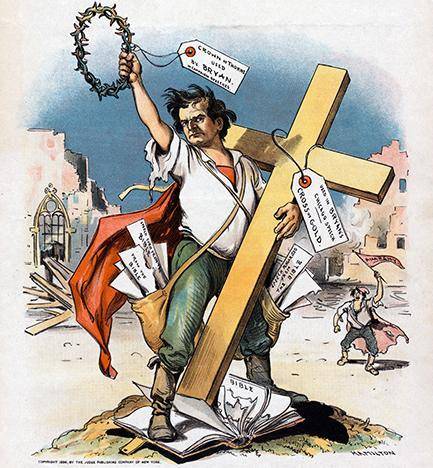
History, 22.09.2021 15:00 gulleraliyeva1999
1. “The merchant at the crossroads store is as much a businessman as the merchant of New York. The farmer who goes forth in the morning and toils all day, begins in the spring and toils all summer, and by the application of brain and muscle to the natural resources of this country creates wealth, is as much a businessman as the man who goes upon the Board of Trade and bets upon the price of grain.”
Main idea of passage:
2. “We say in our platform that we believe that the right to coin money and issue money is a function of government. We believe it. We believe it is a part of sovereignty and can no more with safety be delegated to private individuals than can the power to make penal statutes or levy laws for taxation.”
Main idea of passage:
3. "Those who are opposed to this proposition [that the right to coin money is the right of the government] tell us that the issue of paper money is a function of the bank and that the government ought to go out of the banking business. I stand with Jefferson rather than with them, and tell them, as he did, that the issue of money is a function of the government and that the banks should go out of the governing business.”
Main idea of passage:
4. “If they dare to come out in the open field and defend the gold standard as a good thing, we shall fight them to the uttermost, having behind us the producing masses of the nation and the world. Having behind us the commercial interests and the laboring interests and all the toiling masses, we shall answer their demands for a gold standard by saying to them, you shall not press down upon the brow of labor this crown of thorns. You shall not crucify mankind upon a cross of gold.”
Main idea of passage:
5. Do you think that William Jennings Bryan favored the working class or the wealthy class? What passage could you use to support your answer?
6. Would William Jennings Bryan support a strong national government or a weak national government? What passage would support your answer?
7. What do you think is meant by the passage: “You shall not crucify mankind upon a cross of gold?” Why do you think William Jennings Bryan uses this language to convey his point?
Directions: Look at the political cartoon below and answer the following multiple choice questions. The Photo is Attached
8. Who is depicted in this political cartoon?
a. William McKinley c. William Jennings Bryan
b. Andrew Carnegie d. John D. Rockefeller
9. What currency standard is this political cartoon advocating against?
a. Gold c. Greenback
b. Silver d. Bimetallism


Answers: 1


Another question on History

History, 21.06.2019 21:00
In western europe, under the , jews enjoyed some autonomy. then, during the post–french revolution period, was also tolerant toward the jews.
Answers: 2

History, 21.06.2019 22:40
An alliance of two political parties is know as? a. majority b. coalition c. candidate d. government
Answers: 2

History, 22.06.2019 01:30
What reason did yurovsky give nicholas ii for his pending execution? the czar’s relatives were about to rescue the romanovs. nicholas had committed crimes against the russians. nicholas had misused his power to abuse his own people. nicholas had not lived up to his duties as czar of russia. the answers are not b and c, i already tried those.
Answers: 2

History, 22.06.2019 01:30
Which number shows the location of the united kingdom of great britain?
Answers: 1
You know the right answer?
1. “The merchant at the crossroads store is as much a businessman as the merchant of New York. The f...
Questions

Mathematics, 28.08.2020 18:01


History, 28.08.2020 18:01


History, 28.08.2020 18:01

Social Studies, 28.08.2020 18:01



Mathematics, 28.08.2020 18:01




English, 28.08.2020 18:01


History, 28.08.2020 18:01

Mathematics, 28.08.2020 18:01

Biology, 28.08.2020 18:01






